Catherine Burns
Health correspondent
Vicki Loader
Health producer

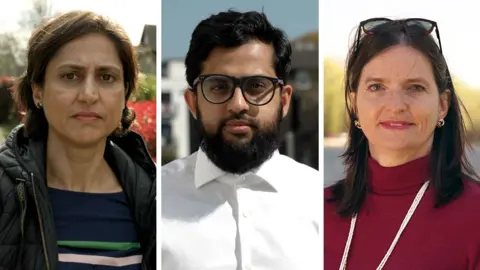 BBC
BBC
More than 1,000 GPs successful England person shared their views astir nan assisted dying measure pinch BBC News
If you inquire these 3 doctors astir being GPs, their answers are remarkably similar.
"It tin beryllium nan champion occupation successful nan world," 1 tells me. It's "a privilege" different says. They each talk astir really they emotion getting to cognize their patients and their families.
But each 3 person different views connected assisted dying.
Right now, nan rule present is clear: medics cannot thief patients to return their ain lives. But that could change.
The Terminally Ill Adults (End of Life) Bill is being debated successful Parliament. And if it goes through, it will springiness immoderate terminally sick patients successful England and Wales nan option of an assisted death.
Here, 3 doctors - Abdul Farooq, Susi Caesar and Gurpreet Khaira, who each person a different position connected assisted dying - show america really they consciousness astir nan proposals.
'A reddish statement I would ne'er cross'
Dr Abdul Farooq is 28 and comparatively caller to his profession arsenic a GP.
We meet astatine his location successful eastbound London. He gives his babe girl a vessel of beverage earlier heading astir nan area to believe successful his section mosque.
His belief is perfectly cardinal to his views connected assisted dying.
"I judge successful nan sanctity of life. As a Muslim, I judge that life is simply a gift from God, and that nary 1 has nan correct to return that away," he says.

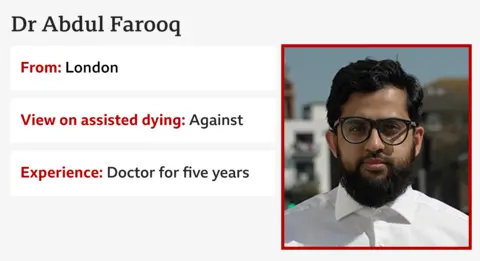
Dr Farooq feels taking your ain life is wrong, and so, he says, it would beryllium "sinful" for him to beryllium progressive successful that process - moreover indirectly.
If this rule passed - and a diligent came to him asking for thief to dice - he would mention them to different doctor.
He says thing beyond that would beryllium "a reddish statement I would ne'er cross".
Dr Farooq's objections are besides informed by his master experience, peculiarly his clip moving successful a hospital.
He describes seeing "undignified deaths" - group passing distant connected engaged wards - and says nan wellness strategy is not getting nan basics correct successful end-of-life care.
"There is truthful overmuch we tin do to make patients comfortable, if we person nan correct resources available," he tells me.
"We person a full section of medicine called palliative medicine that is location to thief group towards nan extremity of their life. So why are we not throwing each our resources and money into that and really making nan process of decease little scary?"
He's besides concerned astir circumstantial parts of nan projected law. Doctors would person to measure if terminally sick patients are expected to dice wrong six months earlier they are approved for an assisted death.
Dr Farooq sees this arsenic problematic. The last time aliases truthful is easy to predict, he says, but adds that immoderate patients he's expected to dice wrong six months tin still beryllium live a twelvemonth later.
Is location thing that could alteration his mind connected assisted dying?
"No," Dr Farooq says without hesitation. "I'm powerfully against it. Personally and professionally, I deliberation it's nan incorrect point to do for patients."
'I'll beryllium astatine nan beforehand of nan queue to help'
Dr Susi Caesar has been a GP for 30 years and thinks she astir apt wouldn't person antecedently been truthful vocal successful her support of assisted dying.
Now, she says she is fresh to "stick her caput supra nan parapet".
Recently she mislaid her beloved dad, Henning. We meet astatine a reservoir adjacent Cirencester because being adjacent h2o reminds her of him.
"My begetter was nan astir astonishing personification and this is truthful evocative of everything he loved," she says. "The outdoors, walks, sailing, boats, kayaking, swimming."

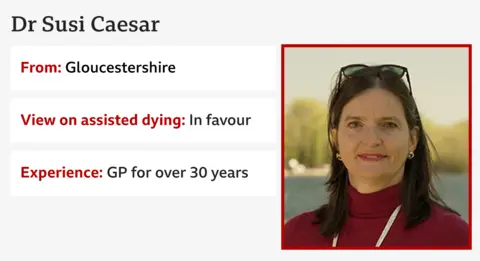
She thinks Henning would beryllium proud of her for talking to america astir her views because he was a semipermanent believer successful assisted dying.
When he was diagnosed pinch a terminal illness, Dr Caesar says he became "terribly frightened astir nan mode of his dying".
"My begetter was a very proud man, and nan point that was unbearable to him was nan thought that he would suffer power astatine nan extremity of his life - of his bodily functions, of his mind, of his expertise to beryllium nan personification that he was."
By nan end, Dr Caesar says her father's "medication ne'er rather kept up pinch his symptoms." For her, nan statement complete assisted dying comes down to diligent choice.
"Everybody is going to die. Every individual deserves nan comfortableness of prime astir really they die. I would want it for myself," she tells me.
She acknowledges that galore of her colleagues person "very, very reasonable concerns" astir assisted dying. But she says "we person nan contented to group up systems that will activity and get complete immoderate of these hurdles."
I inquire if Dr Caesar's support for assisted dying would construe into her moving successful this area.
"I will beryllium astatine nan beforehand of nan queue to thief group to person nan decease that they wanted," she says. "I deliberation that's nan halfway joyousness of my occupation - being pinch group to nan very extremity of their wellness journey."
'A very blameworthy place'
Dr Gurpreet Khaira doesn't person immoderate of nan certainty of Dr Farooq and Dr Caesar.
She describes herself arsenic "pretty conflicted astir nan full subject" of assisted dying.
Dr Khaira is simply a GP successful Birmingham but besides has first-hand acquisition arsenic a patient.
In 2017, she was diagnosed pinch bosom cancer. She recovered chemotherapy gruelling and says if nan crab ever came back, she wouldn't want to spell done it again.

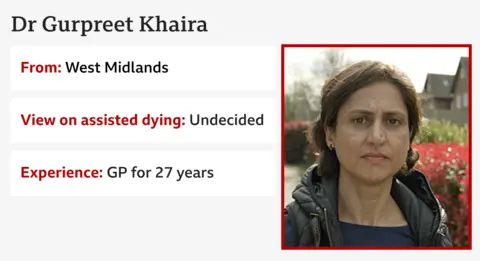
"I retrieve emotion very passionate that I should person nan prime of whether I spell done this benignant of treatment, aliases to opportunity 'that's capable now'," she says.
She says it felt very important for her to person a prime astir nan extremity of her life.
Now, she's a image of health, striding on a hillside pinch ease.
As a GP pinch decades of experience, she worries that susceptible patients mightiness opt for assisted dying alternatively than beryllium a load to their loved ones. Or that immoderate families mightiness coerce susceptible patients into it.
"That is 1 of my biggest areas of individual conflict. I cognize that location are tons of plans to put safeguards in.
"You tin beryllium nan champion expert aliases advocator successful nan world, but you whitethorn not prime up wherever personification is being controlled aliases manipulated."
For her, there's a basal conflict betwixt her individual and master experiences.
But, she adds: "As a doctor, I'd beryllium very reluctant to beryllium handing complete a syringe for a diligent to make that choice."
Balancing up these 2 sides leaves her "in a very blameworthy place", she says, but adds that it's not a weakness to beryllium unfastened minded. For her, making this determination is an "evolving process".
Personal acquisition shaping opinions
It's striking erstwhile talking to Dr Farooq, Dr Caesar and Dr Khaira, really overmuch their views connected assisted dying bespeak their halfway belief systems.
In that respect, GPs are perchance overmuch for illustration nan remainder of us.
If this measure does walk into law, doctors will person to see whether they are consenting to activity successful nan area of assisted dying, aliases not. They could beryllium asked to beryllium progressive successful nan process - whether that's holding preliminary discussions pinch patients who want to die, to prescribing a constituent for personification to extremity their ain life.
If they don't want to, no-one will unit them.
They will person clip to deliberation astir it. If MPs do ballot successful favour of this adjacent month, it could still return years to travel into effect.

 2 minggu yang lalu
2 minggu yang lalu





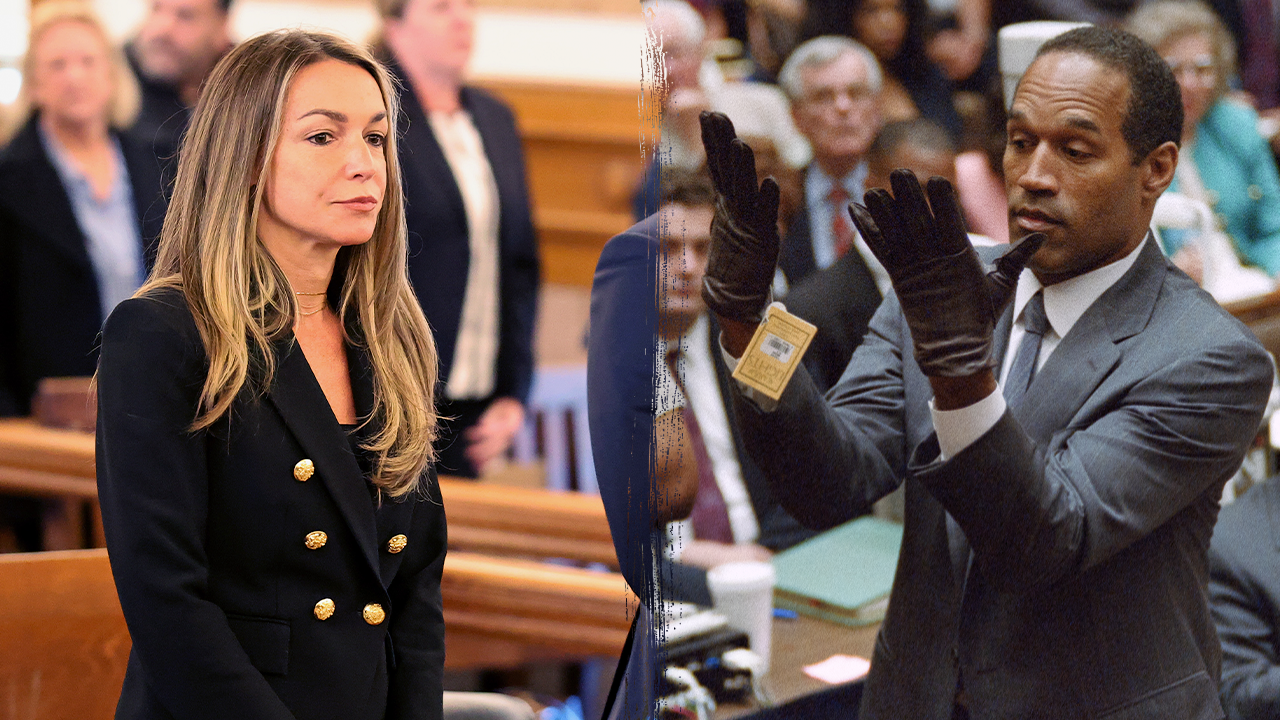


 English (US) ·
English (US) ·  Indonesian (ID) ·
Indonesian (ID) ·